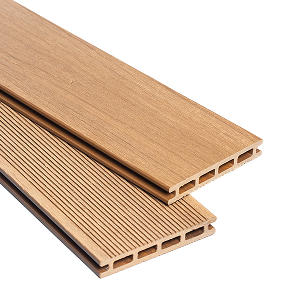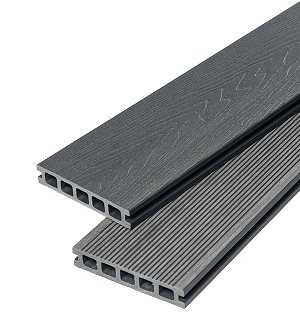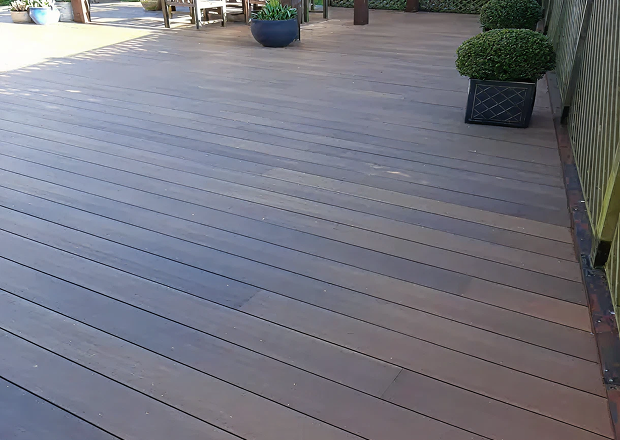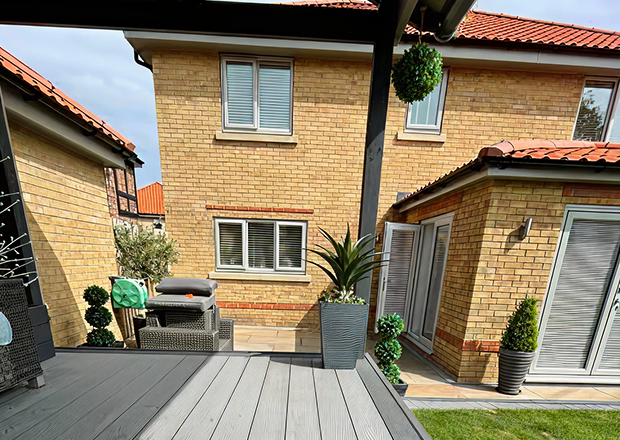 Previous Article
Previous Article
Composite Decking Price Guide


If you’re exploring the possibility of upgrading your garden, you’ve no doubt heard about the many benefits composite decking offers over traditional timber. But what are the real-world advantages, and are there any potential drawbacks you should be aware of?
As a material, composite decking has seen huge leaps in technology since its introduction in the 1990s. Modern boards are more natural and authentic than ever before and offer incredible performance benefits.
This is the number one benefit. Composite decking is a low-maintenance, hassle-free product. There is no need for the annual cycle of sanding, staining, painting, or sealing that timber requires. All it needs is a regular clean with a soft brush and hot, soapy water to keep it looking its best, giving you more time to relax and enjoy your garden.

Generally speaking, composite decking is engineered to last anywhere between 10 to 25 years, provided it is regularly maintained and cared for. This impressive lifespan is due to its minimal water absorption, which prevents the rot, mould, and mildew that cause traditional timber to deteriorate.
The type of board you choose plays a key part in its lifespan. While first-generation boards are robust, modern second-generation (or ‘capped’) boards offer the best long-term performance. These boards are manufactured with a protective shielded layer that gives them superior resilience against moisture, ensuring they won’t weaken or decay over time. This built-in durability is why manufacturers can confidently offer warranties of up to 25 years, making it a reliable investment for your garden.

While all composite decking will lighten slightly over time, its colour consistency is far superior to wood, which can fade to a dull grey very quickly.
have built-in UV resistance and will retain their base colour for years, typically lightening by around 30% in the first few months before settling.
offer the highest level of fade protection. Thanks to a protective PE surface layer, the colour change is often unnoticeable, even after eight or more years.

A key concern for any decking owner is how slippery it gets when wet. While no surface is 100% slip-proof, composite decking offers exceptional non-slip properties compared to timber. This is because its low water absorption prevents the growth of mould and algae, which are the primary causes of a slippery wooden deck.

Unlike timber, which is limited in colour, composite decking comes in a vast array of shades—from modern greys and blacks to rich, natural browns. Many boards are also dual-sided or reversible, offering a smooth or wood grain finish in a single product. This versatility allows for stunning design features like “picture frame” borders using contrasting colours, giving you complete creative control.

Every composite decking board is perfectly straight, uniform in size, and free from knots or defects. This consistency makes the installation process faster and more predictable than working with timber, which can often have warped or split boards that need to be discarded. This uniformity also means less material wastage during your project.

At a time when caring for the environment matters, composite decking is a truly eco-friendly product. It is made from up to 90-99% recycled materials—a blend of reclaimed wood fibres and recycled plastics like milk bottles and shampoo containers that would otherwise end up in landfills. Furthermore, unlike pressure-treated wood, composite decking is not toxic and will not leach chemicals into your garden soil.

Like any product, composite decking has some potential drawbacks. As a company driven by customer feedback, we believe it’s crucial to be honest about these considerations.
Because composite boards contain plastic, they can get hotter in direct summer sunlight than traditional timber decking. This is something to consider if your deck is in a south-facing, all-day sun trap. Using lighter colours can help to mitigate this.

Modern composite decking has an enhanced scratch-resistant surface, but it is not scratch-proof. Heavy garden furniture being dragged across the surface or sharp objects can still leave marks, which can be difficult to repair. It’s important to take care when moving items on your deck.

If you love redecorating and changing your garden’s colour scheme every few years, composite may not be for you. Most paint will not adhere properly to the non-porous surface of a composite board, leading to peeling and flaking. The colour you choose is the colour you will have for its entire lifespan.

As composite decking has grown in popularity, the market has been flooded with suppliers. Some may incorrectly market their product as having “no maintenance” or “no fading,” which is untrue. All composite decking requires some maintenance and will experience some lightening over time. Always choose a reputable supplier who is transparent about the minimum level of cleaning required and the expected performance of each generation of board.

Composite decking offers many significant benefits and advantages over traditional timber, making it the ideal long-term choice for most homeowners. While it has a higher upfront cost, this smart investment pays for itself over the years through reduced ongoing maintenance costs and a much longer, more reliable lifespan.
 Previous Article
Previous Article
Composite Decking Price Guide

How to Safely Build a Pergola on Your Deck (2025 UK Guide)